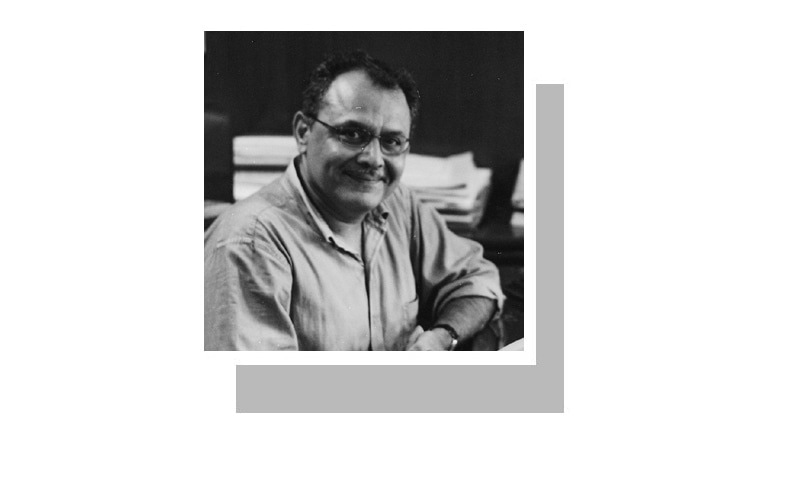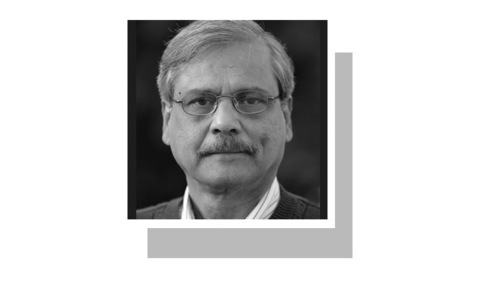
I STARTED journalism in early 1984 when Zia’s press curbs and other ploys, including exploitation of religion, to stay on in power were on display almost every day to a sub, not least because the main workplace for a journalist in that role was the newsroom.
There was a period before I started my career when, as a reader, I recall gaping white holes in newspapers where the military regime’s censors had ripped out offending columns of the written word that even implicitly challenged the dictator’s primacy.
That appeared horrendous and became a potent, even if passive, form of protest as it took a reader a moment’s glance at the newspaper to understand what was happening. In fact, sometimes fairly innocuous items were ordered off the page too.
Although the removal of innocuous material was often down to the intellect of the censor, who usually belonged to the lowest rung of the food chain (who else would stay awake well into the small hours, seven days a week for that distasteful, thankless task?), the reader was left free to read way too much into the white gaps.
This inevitably led to speculation, sometimes right, sometimes wrong, that the defiant political opposition had done something that warranted its news being pulled out of the newspapers’ front pages so that people couldn’t find out.
Such perception was contrary to what those ordering the clampdown wanted to achieve. Even worse for the regime was the gossip — perhaps because such news can be potentially destabilising — of rifts in the ranks of the junta.
Editors were told what the draconian ‘guidelines’ or parameters were. They had to live with these.
Undoubtedly, given the military’s centralised command structure where most, if not all, power and authority vests in the person holding the office of the chief of army staff, any rumours about rifts among senior generals were no more than wishful thinking.
Even then the regime may have thought that these may give ideas to the odd general who was ambitious enough to try and defy the long-established tradition of bowing to the will and command of the army chief. This would have been no doubt a grossly unwelcome possibility.
Therefore, the regime introduced a far more insidious method of controlling content: self-censorship. Editors were communicated in no uncertain terms that the white gaps were making the regime look bad and, therefore, would not be allowed to continue.
The requirement for the newsrooms to send the newspaper proofs to the censor every single night was done away with and editors were told what the draconian ‘ guidelines’ or parameters were. They had to live with these.
Far from any tolerance for blatant violations, no room was left for even slipups as editors had been warned of dire consequences in case of any overstepping of the lines drawn tightly around them. The system of ‘Press advice’ was instituted at around the same time.
Press Information Department officials, working under the information ministry, would be instructed by key regime figures what was allowed to go and, believe me, where. For example every evening the newsroom night editors would receive telephone calls at least once if not more.
They’d be told: ‘… yeh khabar single column inside page par ja saktee hai … aur yeh khabar nahi jayegi aur woh khabar front page pe numayan taur par. [… this news can go in a single column on the inside pages; this one won’t go and that one should figure prominently on the front page.]’
The regime was dictating the news agenda and controlling what the readers would see and what they wouldn’t, from the comfort of their offices, even homes. There were phenomenal acts of defiance by media men and women. But to be honest these were not the norm.
Capitulation was near complete in terms of the content that the papers could carry. Hundreds of frustrated journalists marching and protesting became a familiar sight as they vented their anger on the streets and in congregations at the press clubs.
Yes, another form of defiance that many columnists developed an expertise in was writing between the lines. As a reader I’d turn to the oped pages to read my favourite columnist who offered token resistance via subtle writing skills. (Read my mentor Zamir Niazi’s books chronicling this oppression if you are interested.)
National interest and loyalty to the state became favourite weapons for subjugating the press as the oppressors themselves, almost unchecked by media scrutiny, took the country down the devastating path of religiously inspired militancy and jihad
Since the military leader was being feted in Western capitals and greeted in the White House as the most sincere and welcome ally and friend, no opposition to his policies was tolerated and there was no public debate about the sanity of altering the very fabric, the DNA, of society.
From 1977 to 1985, when finally (even though partyless) elections brought Muhammad Khan Junejo as prime minister and some political and media freedoms, Pakistan changed in many dramatic, ugly ways. At least for me the Pakistan of my childhood was gone for good.
Not that it was all hunky-dory before that. There was often authoritarian rule, poverty, inequality, illiteracy and disease. But there was also a fair amount of tolerance within society. Different faiths existed side by side. Post-Zia, religion was used as a weapon to beat into submission opponents of all hue, perceived or real; hypocrisy became the order of the day.
If today the media makes you feel all is well — that democracy is thriving and we can wait for the next election for its most positive manifestation, that the rule of law is supreme, that justice is being dispensed, that there is no evidence of discontent and angry words even if members of your family including your father and four brothers have been slaughtered by terrorists — then read George Orwell’s 1984.
Also, Google what he meant by Newspeak. This weekend I am planning not to agitate. I have not read 1984 and Animal Farm in some 35 years. So I’ll revisit the two.
The writer is a former editor of Dawn.
Published in Dawn, April 21st, 2018



































